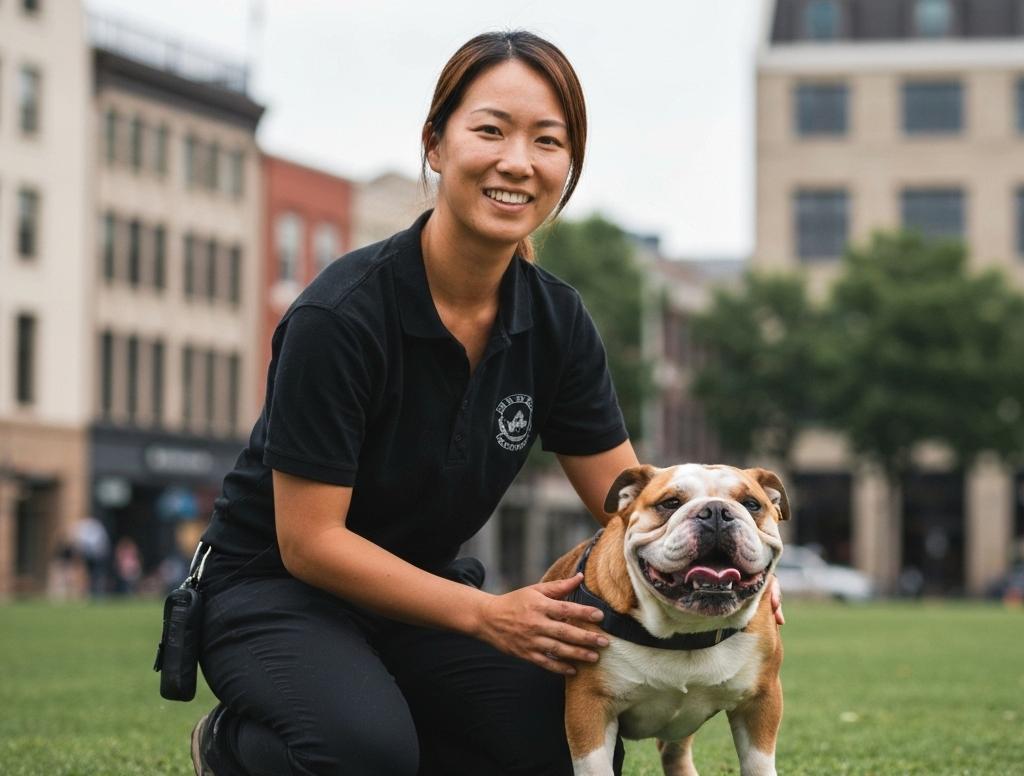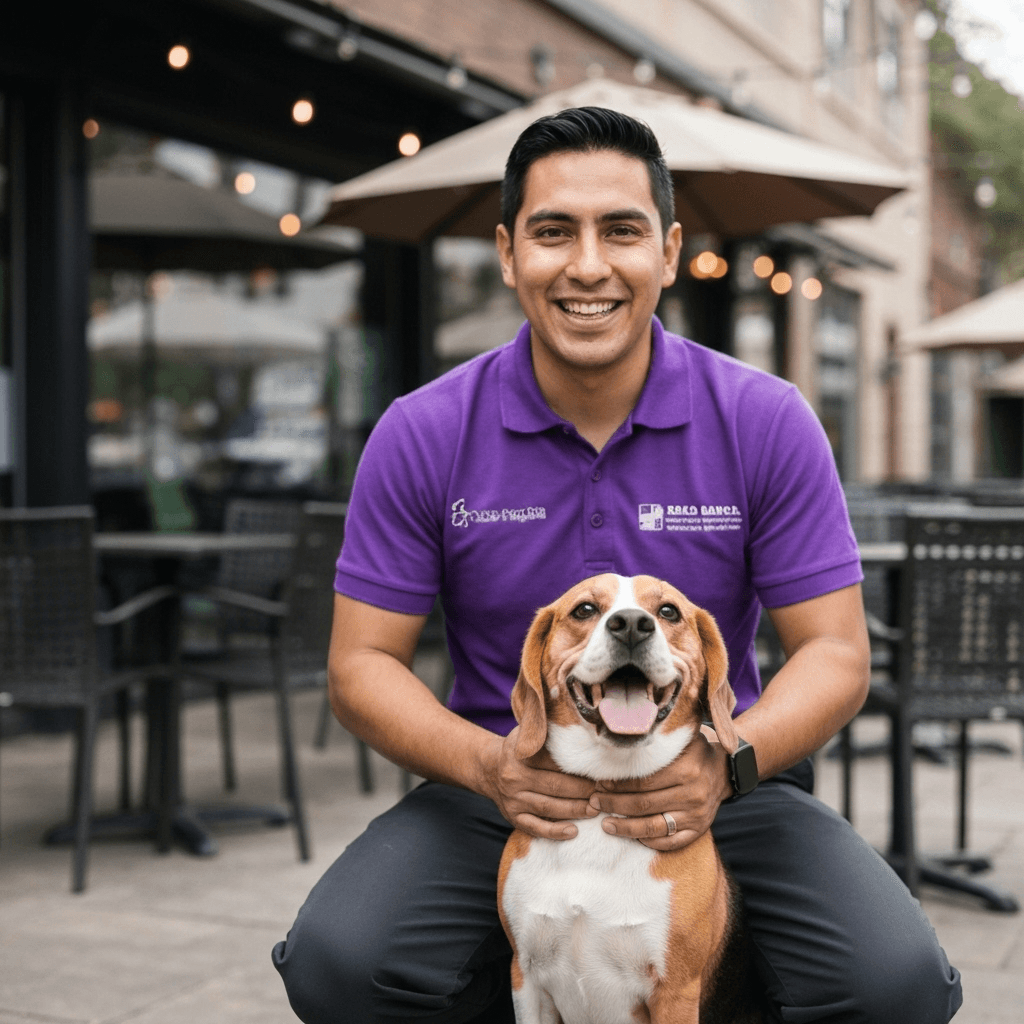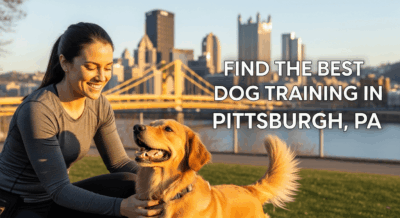Your Complete Guide to Choosing a Dog Trainer in Pittsburgh
Walking your dog through Lawrenceville or grabbing coffee on a Shadyside patio should be enjoyable, not stressful. But if your dog pulls on leash, jumps on strangers, or gets overwhelmed by city noise, those everyday moments can become challenging.
The right trainer doesn’t just teach your dog commands – they help you both navigate Pittsburgh’s unique mix of busy streets, narrow sidewalks, and dog-friendly businesses. Whether you’re dealing with a new puppy in a Squirrel Hill apartment or helping a rescue dog feel comfortable around the crowds at Market Square, finding someone who understands city life makes all the difference.
How to Choose the Right Trainer
Start by looking for trainers who focus on positive reinforcement – rewarding good behavior instead of punishing mistakes. This approach builds your dog’s confidence, which is especially important in a bustling environment where they need to make good choices around distractions.
Think about your living situation too. If you’re in a rowhouse with shared walls, you need someone who can help with barking. If you frequent dog-friendly patios, you want a trainer who can practice real-world scenarios with you, not just work in a sterile classroom.
Ask potential trainers about their credentials. Look for certifications like KPA-CTP, CPDT-KA, or IAABC-CDBC. These show they’ve invested in learning humane, science-based methods and continue their education.
Consider whether you want group classes for socialization or private lessons for personalized attention. Many Pittsburgh trainers offer hybrid approaches – starting with in-home sessions to build foundation skills, then moving to public spaces when your dog is ready to practice around distractions.
If you’re considering board and train, ask detailed questions about where your dog will stay, how much hands-on coaching you’ll receive, and what follow-up support is included. Good programs focus on teaching you just as much as they teach your dog.
Common Dog Training Methods Explained

The best training methods help your dog succeed in real Pittsburgh situations, from navigating weekend farmers markets to staying calm during Steelers victory parades.
Positive reinforcement training rewards behaviors you want to see more of. When your dog sits politely instead of jumping on someone at the dog park, they get praise, treats, or play. This builds enthusiasm for training and helps dogs make good choices even when excited or distracted.
Basic obedience and manners covers the essentials – sit, down, stay, loose leash walking, and polite greetings. These skills make daily life smoother and safer, whether you’re crossing busy Penn Avenue or meeting neighbors in your building’s lobby.
Puppy training and socialization is especially important in the city, where young dogs encounter everything from construction noise to crowded sidewalks. Good puppy classes teach bite inhibition, house training, and how to stay calm around new sights and sounds during critical development periods.
Behavior modification addresses specific challenges like fear, reactivity, or separation anxiety. This requires a structured approach using techniques like desensitization and counterconditioning. For complex issues, look for a certified dog trainer with additional behavior credentials.
Some trainers also offer specialized service dog training or therapy dog preparation. These programs have specific standards and testing requirements, so ask about the trainer’s experience and success rate.
Average Cost of Dog Training in Pittsburgh (Updated for 2025)
Training costs vary based on the trainer’s experience, your location within the metro area, and the complexity of your goals. Expect to pay slightly more for in-home visits in dense neighborhoods like Shadyside or the Strip District.
| Service Type | Typical Price in Pittsburgh | What to Expect |
|---|---|---|
| Group dog training classes (4–6 weeks) | $150–$275 total | Small groups, basic manners or puppy foundations |
| Private lessons in-home or on-location | $100–$165 per 60–75 min | Custom coaching, flexible scheduling, real-world practice |
| Puppy package (4–6 sessions) | $350–$650 total | House training, socialization plan, basic obedience |
| Day training with handoffs | $450–$900 per week | Trainer works with your dog, then coaches you |
| Board and train 2–4 weeks | $1,900–$4,200 total | Intensive training plus owner education |
| Behavior consultation | $125–$225 initial | Assessment, management plan, follow-up recommendations |
Many trainers offer a free consultation to discuss your goals and explain their approach. Package deals often reduce the per-session cost, and some trainers provide payment plans for longer programs.
Remember that training is an investment in your dog’s safety and your relationship. A well-trained dog can join you at more places and activities, making city life richer for both of you.
Pittsburgh and Allegheny County Rules That Matter
Understanding local laws helps you train responsibly and know where you can practice different skills.
Dogs must be leashed and under control on all public property except designated off-leash areas. This includes sidewalks, parks, and business districts. Pittsburgh Animal Care & Control handles enforcement and provides guidance at pittsburghpa.gov.
Pennsylvania requires annual dog licenses for dogs over 3 months old, issued through county treasurers. In Allegheny County, you can get details and apply online at the County Treasurer's website.
Rabies vaccination is mandatory statewide for dogs over 3 months old. The Pennsylvania Department of Health provides complete requirements at health.pa.gov.
Pennsylvania’s Dog Law covers licensing, identification, and dangerous dog provisions. You can read the full regulations at agriculture.pa.gov.
While Pennsylvania doesn’t require special licenses for dog trainers, responsible professionals carry liability insurance and provide clear policies about their methods and services.
Questions to Ask Potential Trainers
The right questions help you find someone whose approach matches your goals and values.
- What training methods do you use, and how do you handle mistakes or unwanted behaviors?
- What credentials do you hold, and how do you stay current with training science?
- Can you work with us in our neighborhood and help us practice in real-world situations?
- How many training sessions typically help dogs reach goals similar to mine?
- What homework or practice will be expected between sessions?
- How do you handle reactivity or aggression, and when do you recommend veterinary consultation?
- Do you carry liability insurance?
- For board and train programs, where will my dog stay, and how will you teach me to maintain the training?
Trust your instincts during initial conversations. A good trainer should listen to your concerns, explain their methods clearly, and make you feel comfortable asking questions.
Local Pittsburgh Resources for Dog Owners
Pittsburgh offers plenty of places to practice training and socialize your dog once they’re ready.
Off-leash areas include Frick Park Off-Leash Exercise Area (Point Breeze/Squirrel Hill), Riverview Park Off-Leash Dog Area (North Side), and Bernard Dog Run (Lawrenceville). Allegheny County also maintains areas at South Park and Hartwood Acres – check county parks website for current rules.
The Three Rivers Heritage Trail provides miles of paved paths perfect for leash training around joggers, cyclists, and other dogs. Find trail maps and conditions at Friends of the Riverfront.
For official information about licensing, animal control, and city services, visit Pittsburgh Animal Care & Control.

Common Questions About Dog Training in Pittsburgh
How much does in-home dog training cost?
Most Pittsburgh trainers charge $100 to $165 for 60-75 minute in-home sessions. Rates may be higher for evening appointments, multiple dogs, or complex behavior issues that require specialized expertise.
Is in-home dog training worth the extra cost?
For city dogs, absolutely. Training in your actual environment – your apartment hallway, your neighborhood sidewalks, your regular walking routes – helps dogs learn faster and makes the skills more reliable when you need them most.
Can a trainer help with house training?
Yes, many trainers include potty training in puppy packages or day training programs. They’ll set up management systems and teach you timing, but consistency at home between sessions is crucial for success.
What’s the 3-3-3 rule for dogs?
This guideline helps set realistic expectations for newly adopted dogs: 3 days to decompress from the stress of change, 3 weeks to start understanding household routines, and 3 months to truly feel settled and show their real personality.
How long does dog training take?
Basic manners usually improve noticeably within 4-8 weeks of consistent practice. More complex issues like reactivity or separation anxiety often take several months and benefit from ongoing professional guidance.
What should I bring to group classes?
Pack a regular collar or harness, 6-foot leash (not retractable), water bowl, and lots of small, high-value treats. Avoid training tools like prong or shock collars – good trainers work with positive reinforcement methods.
What are Pittsburgh’s leash laws?
Dogs must be leashed and under owner control in all public spaces except designated off-leash areas. Check Pittsburgh Animal Care & Control for enforcement information and reporting procedures.
Do I need a dog license?
Yes, Pennsylvania requires annual licenses for dogs over 3 months old. In Allegheny County, apply through the County Treasurer’s office. Licenses help reunite lost pets with families and fund animal services.
What vaccinations are required?
Rabies vaccination is mandatory statewide for dogs over 3 months old. Your veterinarian may recommend additional vaccines based on your dog’s lifestyle and risk factors. See PA Department of Health for official requirements.
Are dog trainers licensed in Pennsylvania?
No state or local license is required, but many trainers pursue voluntary certifications from organizations like KPA or IAABC. Reputable trainers also carry liability insurance and provide clear service agreements.
Where can I practice off-leash recall?
Stick to fenced off-leash areas like Frick Park, Riverview Park, Bernard Dog Run, or county facilities at South Park and Hartwood Acres. Always follow posted rules and keep sessions short to avoid disrupting other dogs and owners.
Can trainers hold classes in public parks?
Yes, but commercial activities may require permits from the city or county. Professional trainers typically handle permissions and carry insurance for public venues. Ask about their policies if you’re interested in group classes held outdoors.
Where can I walk my dog on trails?
The Three Rivers Heritage Trail welcomes leashed dogs and provides excellent practice opportunities around distractions. Many state parks also allow leashed pets – check DCNR pet policies for specific trail rules.
Living with a dog in Pittsburgh comes with unique challenges and incredible rewards. The right training helps you both make the most of everything the city offers, from riverside walks to neighborhood festivals. Focus on finding a trainer who uses positive methods, understands urban life, and can help you build the partnership you both deserve.
